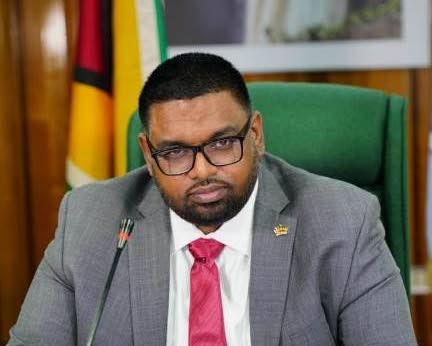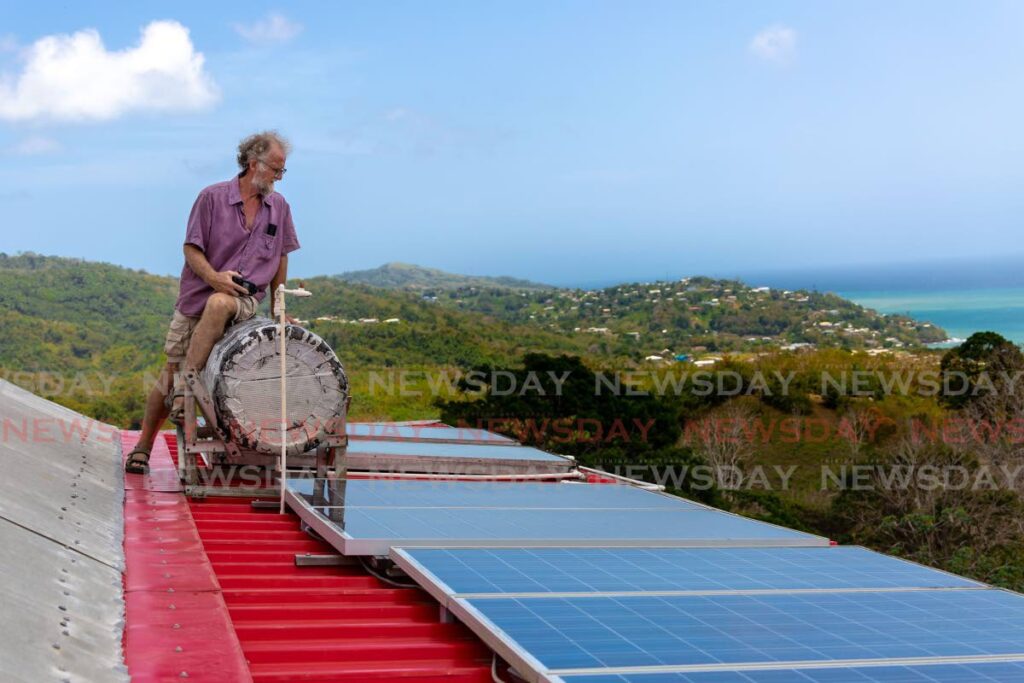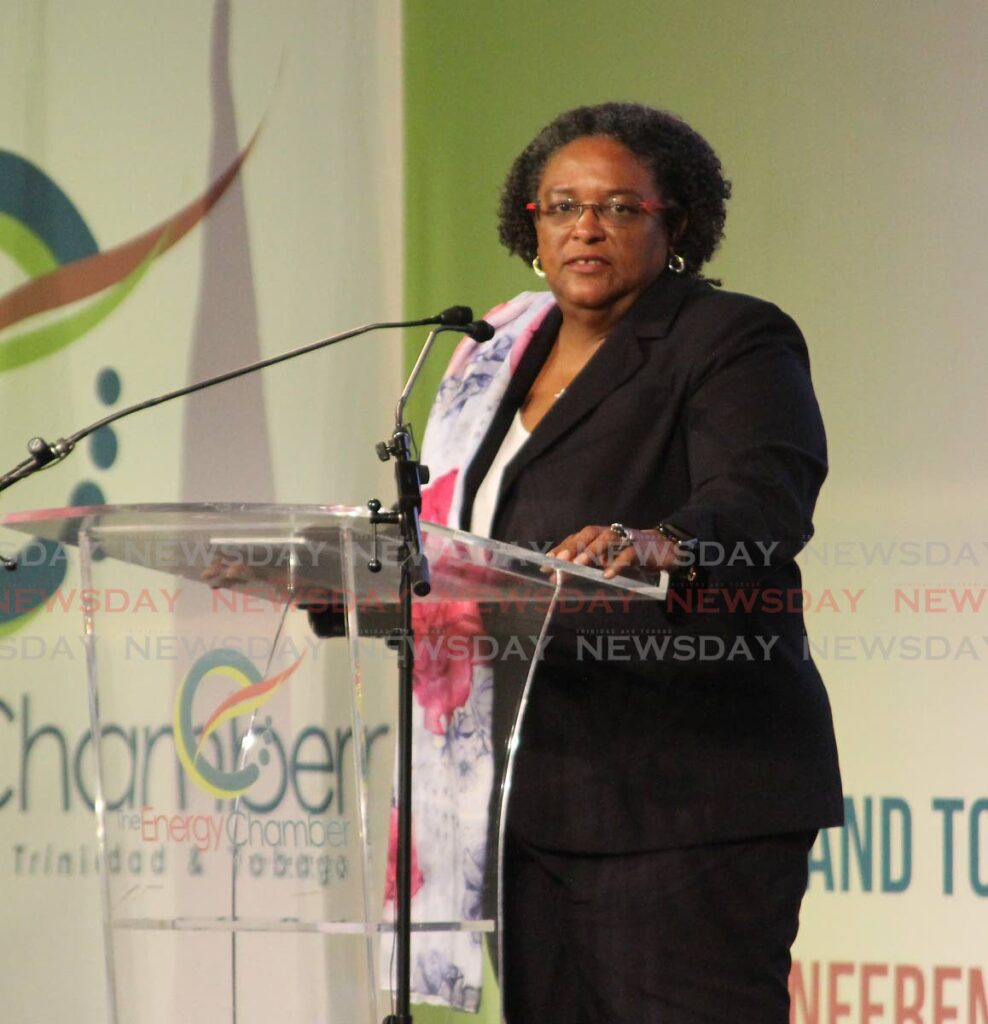Regional leaders: Caribbean must chart course on climate change

The establishment of viable, low carbon onshore economies is an important part of the conversation in the Caribbean about sustainable energy and climate change.
Guyana President Dr Mohammed Irfaan Ali made this observation when he addressed the opening of the virtual Caribbean Sustainable Energy Conference 2022 on Monday.
Ali told participants the intertwined issues of climate change were not academic ones. These issues, he continued, are scientific, practical and affect people's livelihoods, and strategies to deal with them must be implementable. "As leaders, we have to think about these things too."
While small developing states and small island developing states (SIDS) are not major contributors to global greenhouse gas emissions, Ali said these countries bear the brunt of the adverse effects of climate change. These include rising sea levels, floods, droughts and extreme weather events.
Ali said these events exact huge tolls on the economies of these nations and their financial resources to meet climate change commitments. Guyana and Trinidad and Tobago are not immune from the effects of climate change. Ali recalled reading local commentaries that TT is experiencing climate change events such as erosion of beaches, drier soils and damage to fish landing sites. Despite 80 per cent of its lands being covered by forests, Ali said Guyana is not allowing this to lull it into complacency were climate change is concerned.

How the world handles unexpected challenges like the covid19 pandemic, influences how it deals with known challenges like climate change.
Ali said the readiness of the world to deal with the pandemic has important lessons about its readiness to deal with climate change. The pandemic continues to be a test of global resolve "in the face of deaths and economic destruction."
"Here's an example of the results so far: 62.1 per cent of the global population is now vaccinated with at least one dose."
But, Ali went on, "Guess what? Only 9.5 per cent of people in low-income countries have received at least one dose. The question is why?"
He told participants everyone knows the answer. While countries must invest to protect their populations against covid19 and climate change, Ali said, "They must also survive and meet their immediate needs." He lamented, "This recent test of global resolve (with covid19) did not give much hope."
He was optimistic the world can learn lessons from the pandemic and use them to address climate change better. "Guyana is on such a path." Saying Guyana aims to reduce its carbon emissions by 70 per cent by 2030, Ali said part of that plan involves the use of natural gas as a transition fuel
"Guyana's natural gas reserves will be put to work to help generate energy in the electricity sector and in so doing, reduce fossil-fuel generating sources of energy." He cited the construction of a 165 megawatt hydroelectric plant at Amalia Falls as another example of providing a cheaper renewable energy source to the people of Guyana.
Solar projects are in the pipeline to provide power to remote communities in Guyana. Ali also spoke about plans to build a 250 megawatt plant to generate energy from natural gas located in Guyana's offshore marine acreages. This plant, Ali continued, will be linked to the establishment of an industrial park that will produce liquefied petroleum gas (LPG) for the domestic market and for export.
Guyana is also looking at ensuring energy security with Brazil, Suriname and French Guiana. Ali disclosed a memorandum of understanding was signed between Guyana, Brazil and Suriname to explore the creation of an energy corridor between them. Apart from increasing the energy security of all three countries, Ali said it could also boost the confidence of foreign investors who are looking for countries with stable and reliable energy sources, to establish their businesses.

Referring to an agreement signed in 2009 with Norway to sustainably manage Guyana's forests, Ali said, "We are in the process of revising this strategy. It is being expanded to include the provision of environmental services, protection of our biodiversity and water resources, development of our marine economy and the promotion of climate resilience.
Barbados' thrust to cleaner energy
Special envoy (on investments and financial services) to Barbados Prime Minister Mia Mottley, Prof Avinash Persaud said countries whose economies are centred on fossil fuels, must not believe they have an inordinate period of time to make the transition from those fuels to cleaner, more sustainable energy.
Reminding participants that one of the agreements out of last November's COP26 summit in Glasgow, Scotland was achieving global net zero carbon emissions by 2050, Persaud said fossil-fuel producing nations have 20 years to make that change.

Referring to an earlier contribution by President Ali, Persaud said, "The challenge for fossil fuel producers is how do you make the energy and economic transition." While the usage of renewable energy in Barbados is currently 20 per cent, Persaud indicated the objective of Mottley's administration is to reduce the island's carbon emissions by 70 per cent.
He told participants that transitioning to cleaner energy was a key plank in Mottley's Barbados Labour Party's (BLP) recent successful general election campaign. The BLP won all 30 seats in Barbados' parliament in a snap election on January 19. Persaud said free solar panels were distributed to several poor households in Barbados and the Government handled half of the cost, allowing homeowners time to pay off the other half. The objective, he continued, was to encourage homeowners to choose local, renewable energy sources to power their homes. "This is distributing energy for real change."
Young: TT must find a balance
As he acknowledged Persaud's comments, Energy Minister Stuart Young said, "When your economy is dependent on something, your perspective is of course focused on the protection of that (something)."
He recalled when the covid19 pandemic began in March 2020, a big part of the conversation at the time was the impact of covid19 on cruise ships and Caricom countries with tourism-dependent economies. With TT's economy heavily dependent on the energy sector, Young said, "We in TT of course have to find a balance." That balance, he continued, "is the protection of our energy-based economy whilst being very focused on our global objectives and our global commitment to reduce the dangerous greenhouse gas emissions and to decarbonise and invest in greener, cleaner energy."
He added, "The truth is, this really is a conversation that we need to take to the wealthy and developed countries (who are the major contributors to greenhouse gas emissions). He said apart from ensuring these countries keep their commitments to reduce greenhouse gas emissions, they must also keep their commitments to provide financial and technological assistance to developing countries to help them reduce their emissions, as outlined in the Paris Climate Change Agreement of December 15, 2015 and the Glasgow Climate Pact arising out of the COP26 summit in Scotland last November.
Young was confident that an agreement for a 112.2 megawatts solar photovoltaic project (Project Lara) with a consortium comprising bpTT, Shell and Lighthouse bpTT, will be signed off and executed before the end of February. In his 2022 budget presentation in Parliament last October, Finance Minister Colm Imbert said this project involved the construction of two solar photovoltaic plants at Couva and Trincity at a cost of US$100 million.
TT, Young continued, is fortunate that 99. 9 per cent of its electricity is generated through the use of natural gas. As the cleanest fossil fuel, Young said, "The reality is natural gas is here to stay and will be here for many decades to come." He also said ammonia and methanol, which are produced by companies at the Pont Lisas Industrial Estate, are at the forefront of the products being used for cleaner, greener energy. Young reminded participants he was part of the delegation that accompanied the Prime Minister to the COP26 summit. He recalled seeing inoperable wind turbines on several hills in Scotland and an energy crisis that affected several European countries, which were heavily dependent on renewable energy, last year.
Young said this reinforces the view that renewables by themselves will will not satisfy all energy needs. "There is no one stop fix."
What regional governments, energy stakeholders are doing
Dr Cletus Bertin, executive director, Caribbean Electric Utility Services Corporation (Carilec) in St Lucia, and National Gas Company president Mark Loquan agreed with Young about the role natural gas plays in supporting the transition to renewable energy and providing a back-up energy source to renewables as well. Loquan observed there are public-private sector partnerships which can drive energy transitions.
Energy Chamber decarbonisation taskforce chairman Dr Dale Ramlakhan suggested Tobago consider the use of renewable energy in the medium term to provide some of the energy needs for its tourism sector. He also suggested TT explore opportunities for collaboration with other Caribbean countries, if it wants to use renewable energy sources to electrify its petrochemical sector. He noted geothermal and hydroelectric initiatives being pursued in the Eastern Caribbean and Guyana respectively.
Energy Chamber chairman Dwight Mahabir underscored the importance for the region to move swiftly on the issue of climate change. "We are confident that the region can indeed make the bold changes that are needed and create a sustainable future for the Caribbean." While the challenge to making this change is daunting, Mahabir said, "The region has taken on big challenges in the past and has shown that when we put our minds to it – this remarkable set of small nations can be world leaders."
BPTT CEO Clare Fitzpatrick said, "When it comes to the energy transition – we need a global, regional, local and individual approach and we need leadership at all these levels." While there is no agreed definition about what sustainable energy is, Fitzpatrick said the common denominator is that it is "energy that meets the needs of the present without compromising the ability of future generations to meet their own needs." Such a definition, also needs to include environmental, social and economic needs.
"Our ability to meet climate commitments and the energy needs of the people in the Caribbean will take all hands on deck. Companies like ours need to continue to take action to improve our operations and to partner and work with others to support broader country and regional goals."
Fitzpatrick said, "While the government has a role to play to frame policy and regulatory frameworks that can support investment; business organisations such as the energy chamber also have a role to play in supporting thought leadership and collaboration across industry stakeholders."
She also said academic institutions are needed to support research and "up-skilling our graduates, companies need to lead by building talent, bringing technology, know-how and best practices to the table."
Caribbean Centre for Energy Efficiency and Renewable Energy executive director Gary Jackson agreed with Fitzpatrick. "I think we all have a leadership role to play. We need to walk the talk. We need to have everyone involved in the conversation."
Caribbean Climate Smart Accelerator CEO Racquel Moses said several different renewable energy pathways are being explored in the region. "We don't need to look outside the region, necessarily to learn a lot."
Jamaica's science minister Daryl Vaz said Jamaica is exploring solar and wind initiatives as it seeks to achieve a 70 per cent reduction in carbon emissions by 2050.
UK COP26 envoy Dr John Murton said all Caribbean countries participating at COP26 played vital roles in the Glasgow Climate Pact that was signed at the end of the summit. He added it was the Barbados PM who set the tone for many discussions there. But Murton said the pact is just words on a piece of paper at this time.
"As the ink dries, we must turn to delivery (on climate-change initiatives)."

Comments
"Regional leaders: Caribbean must chart course on climate change"